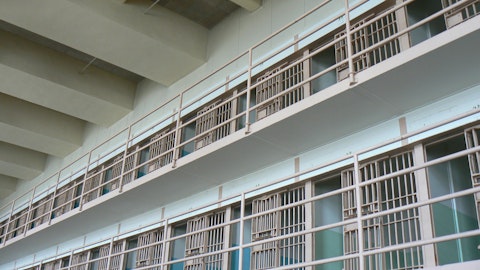Jose Gordo: Well, I think that the, the new leadership in that — in the house is looking for areas of cost savings, that the agency itself DHS is realigning its budgetary programs for its different divisions along the lines of its overall allocation for DHS. So, there’s pressures on whether there’s enough money for securing the border detention capacity, the ISAP program, which is an alternative to detention. So, there has to be a balance between the funding for detention and for the funding for alternatives to detention. And those are political considerations that I think have yet to be finally ironed out, and we’re awaiting the outcome of it.
Jay McCanless: Okay. All right. That makes more sense. Thank you. And then the electronic monitoring segment has seen strong margins historically, which has driven margins for the overall business higher over the past couple of years. I guess, given the outlook for ISAP. Could you speak to your ability to hold electronic margins where they are or potentially even expanding those margins going forward?
Jose Gordo: Well, I think we’re going to be looking for cost economies in technology that underpins the program itself. So, yes, we will. We’re mindful of the pressures on the program and potential funding and we have some ideas on how to deal with those issues in achieving cost economies in the program.
Jay McCanless: Got it. And then the last question for us, there seems to be a high amount of hesitancy about what May 11 actually means from you guys, as well as from your competitor. I guess, maybe, could you frame both sides of the argument that says Title 42 will be rescinded on May 11 versus not being rescinded?
George Zoley: We really don’t know the outcome as to, if it will be rescinded or not rescinded, or it’s — it hasn’t made a difference to us yet. And it — I think it’s still within political discussion as to what it means. I don’t think that has been resolved. You have a house that wants a secure border, and you have Title 42 that’s been used as a means to control access to the border. And those two things have not been resolved yet.
Jay McCanless: Okay. Okay, great. Thank you. Appreciate all the time.
Operator: Our next question will come from Mitra Ramgopal with Sidoti. You may now go ahead.
Mitra Ramgopal: Yes. Hi, good morning and thanks for taking the questions. First, if you can maybe touch, you referenced the continuing inflationary trends. And just curious in terms of your ability to mitigate the higher labor, medical and food costs you’re seeing.
Jose Gordo: In our state facilities — well, let may begin, at the federal level, we have not incurred any difficulties with regarding labor costs, which represents 60% or more of our overall costs in providing capacity for our federal customers. At the state level, we’ve had very good cooperation with our state clients regarding the needed increase in compensation for correctional officers, medical staff and administrative staff as well. So, one by one, we we’ve been able to get significant improvements in our funding to deal with those issues of increasing wages for the staff at — in — the floor staff, the medical staff, as well as the administrative staff. So, I think, in general, we’ve been successful across the board in — with our state clients in dealing with those issues.
Mitra Ramgopal: Okay. Thanks. And as I look at CapEx for tech spending, is that pretty much really intended for the BI subsidiary and driving growth and some of the cost economies you’re talking about?
Brian Evans: This is Brian. Yes, that’s all related to the electronic monitoring unit. So we want to break that out separately from the rest of the CapEx for the secure services and reentry businesses.
Mitra Ramgopal: And if that something we should see, as its still very early stages, and it’s a multi-year strategy, in terms of the spend there.
Brian Evans: Well, it’s — I think it’s pretty consistent over the last couple of years and it’s consistent as, I’d say, percentage of their revenue over time. They have 10s of 1,000s of units in service, it’s to maintain those units, replace units, develop new technologies, stay on the cutting edge of the services that they’re providing. So, I think it’s a pretty consistent number. There are a couple projects that are ongoing, that are one-off that are part of that. So it may come down some in the future years as some of those projects are completed.
Mitra Ramgopal: Okay. Thanks. And I think you mentioned in terms of the 2023 guidance, your €“ your assumptions in terms of potential reactivation of currently idle facilities. I was just wondering what the strategy is in terms of how long you’re prepared to carry some facilities as opposed to maybe considering an asset sale if you’re not able to get it filled after a period of time?
George Zoley: Well, we are in discussions with some governmental agencies, regarding a few of our facilities, others we continue to hold and seek out, operating agreements for those facilities. And we’ve been successful in the past in doing so.
Brian Evans: And I think some of the smaller facilities that we’ve been able to successfully sell as well. And so we’re not €“ it’s not mutually exclusive to any of the facilities. I think, as George just pointing out, though, with the larger facilities, our preference is to continue to try to reactivate them. And we’ve had pretty good success with that over time.
Mitra Ramgopal: Okay. Thanks. And then finally, that was a nice contract announcement in terms of GEO Australia, just wondering in terms of potential additional opportunities in Australia, and maybe even beyond as you look to maybe go more on the international front right now?
George Zoley: There are other opportunities that are available throughout the country in healthcare it’s not a major business objective at this time. But we have the full capabilities of entering that market, given that we have our own healthcare division within the company that provides all the health care services for all the GEO facilities.
Mitra Ramgopal: Okay. Thanks.
George Zoley: And then, prior to be in €“ we were in the healthcare business. So we have that expertise.
Mitra Ramgopal: Right. And I take it again, at this point, no plans in terms of going beyond South Africa and Australia and the International market?
George Zoley: We’re looking at opportunities at this time, but it’s not the most active business part of our objectives.
Mitra Ramgopal: All right. Okay. Thanks again for taking the questions.
George Zoley: Thank you.
Operator: Our next question will come from Kirk Ludtke with Imperial Capital. You may now go ahead.
Kirk Ludtke: Yeah. Hello, everyone. Thank you for the call. Just back to ISAP just for a second. Is it safe to say that DHS is saving its budget in case there’s a surge at the border?
George Zoley: Well, we really can’t speak for DHS. We have very little insight to their budgeting. Even to their policy decisions, we only know about them after they’re publicly released. So €“
Kirk Ludtke: Right.
George Zoley: I really can’t speak it.
Kirk Ludtke: Right. Okay, I get it. But that might be what’s happening?
Jose Gordo: They may be anticipating the long awaited surge at the border, particularly as the temperature grows warmer, and it is the summer months when the most people come across the border, historically, we’ve been doing this for four decades. And the lowest months of migration across the border is in December and January, it’s those two particular months. And the highest month for activity is the summer months as the temperature warms.
Kirk Ludtke: Got it. I appreciate it. Thank you. That’s helpful. And you did mention the success of the program, why would someone leave the ISAP program before their final hearing and who decides that?
Jose Gordo: We do not decide that. That’s decided by ICE personnel.
Kirk Ludtke: Okay, got it. Just a follow-up on the Marshals contract, congratulations on Robert Deyton. It’s a nice extension. Was that — is that now structured as an IGA, or how did that happen?
Jose Gordo: No, that’s a direct contract. And that’s why it was under the auspices of the presidential executive order regarding possible defunding of such direct contracts with the Marshals office and private entities. We gain, I guess, special approval given the locations in circumstances or surrounding that facility, and how it interacts with the federal court in that particular location to continue that contract.
Kirk Ludtke: That’s — is that the first time that’s happened since the executive order was issued?
Jose Gordo: No, it’s, I think now the third. The first one being the facility in San Diego.
Kirk Ludtke: Okay. Well, good. That’s — I guess that’s positive. What does your guidance assume with respect to the other two direct contracts? US Marshal contracts of the western region and Rio Grande? Are you assuming that those get renewed?
Jose Gordo: Well, San Diego is the western region and that’s been approved for an extension and Rio Grande as well.
Kirk Ludtke: All right. Okay. Thank you. And then lastly, I didn’t see free cash flow guidance in the release. But if you can back into the change in net debt that you’re forecasting and that equates to about $175 million decline in net debt. Is that a good proxy for free cash flow?




